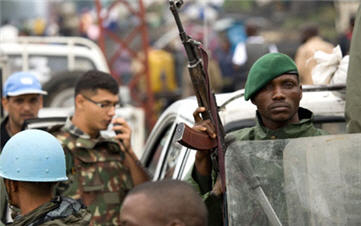
Rights activists have urged the UN to change its policy in eastern Democratic Republic of Congo after a leaked report said the rebellion there was worsening.
Human Rights Watch called for a greater effort to tackle a global crime network backing the ethnic Hutu rebels.
The leaked report, by UN-mandated experts, said there had been an upsurge in violence despite the UN joining the Congolese army to fight the rebels.
The Security Council has been debating the findings of the experts.
Rights groups have long criticised the Congolese government and the UN over the offensive against the rebels, known as the Democratic Forces for the Liberation of Rwanda (FDLR).
'Exacerbating the crisis'
The US-based Human Rights Watch (HRW) has been one of the main critics - saying the UN risked complicity in murders and rapes.
The group's Anneke Van Woudenberg told the BBC's Network Africa programme that the leaked report and her own research showed that current policies were unlikely to succeed.
"There needs to be a comprehensive approach to dealing with this group [the FDLR]," she said.
"The report that was leaked today shows the huge diaspora networks that assist in money-laundering, in arms-trafficking, in the extraction of minerals and in the sale of those minerals.
"Until you cut off that side of it, I don't think these operations are going to have any success."
The UN has actively supported the operation in the hope that it could bring stability to the region.
But the leaked report says: "Military operations have not succeeded in neutralising the FDLR and have exacerbated the humanitarian crisis."
UN's 'contradiction'
The UN, however, has defended the role of its mission in DR Congo, known as Monuc.
Spokesman Manoj Manoubai pointed to successes Monuc had had in other parts of the country - particularly in Ituri province where a bitter conflict ended in 2003 and several alleged warlords have gone on trial.
"Thanks to the work Monuc did, districts like Ituri today are at peace," he told the BBC's World Today programme.
"They used to have over 20 different armed groups active in Ituri, today Ituri is pretty much a very peaceful place."
The report does not criticise Monuc - but suggests there may be a contradiction in its mission to both protect civilians and back a military campaign widely accused of atrocities.
The report says FDLR rebels - some of whose leaders were involved in the Rwandan genocide - have been able to use vast international networks to bolster their supply of arms and recruit extra soldiers.
And it says the Rwandan rebels are also supported by senior members of the Congolese military - the very people who are supposed to be fighting them.
It says the Congolese army has factions within it operating effectively as separate militias.
The Security Council, which has already voted twice to continue the mission despite opposition from rights groups, faces a decision on whether to renew Monuc's mandate at the end of the year.
Analysts say the UN will be closely watched to see how it takes into account the latest revelations.
Related articles
- • DRC and Rwanda Sign Declaration of Principles for Peace in Eastern Congo (April 25, 2025)
- • UK Suspends Financial Aid to Rwanda Over M23 Rebellion (February 25, 2025)
- • Tshisekedi Announces Government of National Unity and Calls for Unity Against M23 Rebels (February 23, 2025)
- • UN Security Council Calls on Rwanda to Stop Supporting M23 Rebels in DR Congo (February 22, 2025)
- • Rwanda-Backed M23 Rebels Summarily Executed Children in Bukavu, UN Reports (February 19, 2025)
- • DR Congo Citizens Head to Polls to Elect President, Members of Parliament (December 20, 2023)
- • 'Deadly environment' plus 'political and social' obstacles hinder Ebola fight, Security Council hears (July 24, 2019)
- • Ebola outbreak declared an international Public Health Emergency (July 17, 2019)
- • DR Congo Delays Results of December Election (January 6, 2019)
- • At least 30 dead after massacres in Ituri (March 2, 2018)
- • Peacekeepers, Congo Army to Resume Joint Fight Against Rwandan Rebels (January 28, 2016)
- • Political tensions 'running high' in DR Congo ahead of 2016 elections (October 7, 2015)
- • UN Report Blames Ugandan Islamists for 237 Killings in DR Congo (May 14, 2015)
- • DRC Army Putting Pressure on FDLR (April 1, 2015)
- • ICC Confirms 14-Year Sentence Against Thomas Lubanga (December 1, 2014)
- • Southern African Leaders to Meet in Zimbabwe (August 15, 2014)
- • Senior UN officials urge Brazzaville to halt expulsion of DR Congo nationals (May 26, 2014)
- • ICC sentences Germain Katanga to 12 years (May 23, 2014)
- • Kerry Calls on Kabila to Honor Constitution (May 4, 2014)
- • Security Council extends UN mission, intervention force in DR Congo for one year (March 28, 2014)
- • ICC finds Germain Katanga guilty of war crimes and crime against humanity (March 7, 2014)
- • Bosco Ntaganda Attacked Civilians on Ethnic Grounds, ICC Prosecutor Says (February 10, 2014)
- • New DR Congo amnesty law welcomed by UN envoys (February 5, 2014)
- • Colonel Mamadou Ndala Is Killed in Ambush (January 2, 2014)
- • No 'Peace Deal' With Defeated M23 Rebels, DR Congo Says (November 11, 2013)
- • Congo Will Not Sign a 'Peace Deal' With Defeated M23 Rebels, Government Says (November 6, 2013)
- • Congo Army Takes Control of Mbuzi Hill From M23 Rebels (November 4, 2013)
- • Kabila Congratulates Congo Army for Defeating M23 Rebels (October 30, 2013)
- • Advancing Congo Troops Take Control of Rumangabo From M23 Rebels (October 28, 2013)
- • Congo Army Liberates Rutshuru, Kiwanja and Kibumba From M23 Rebels (October 27, 2013)







